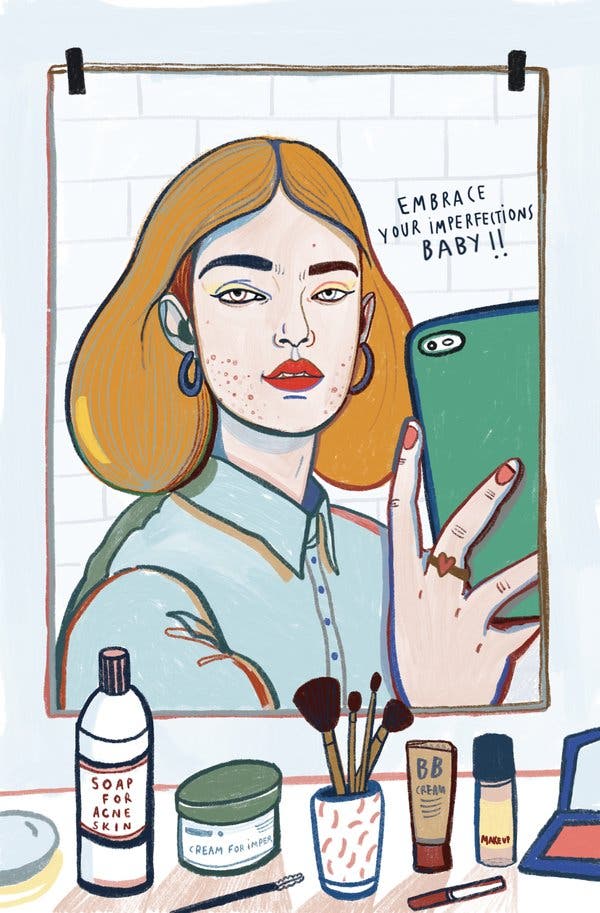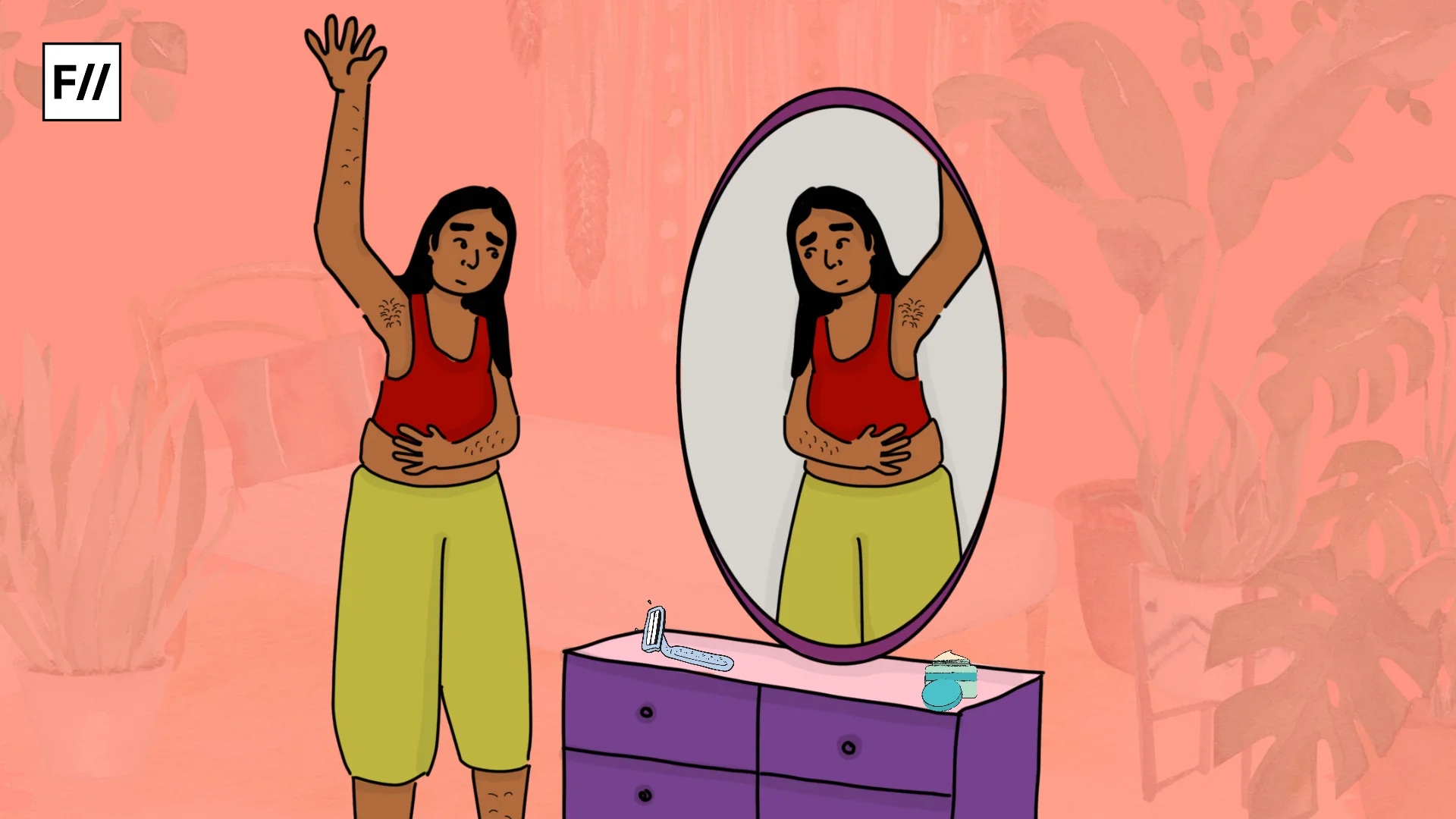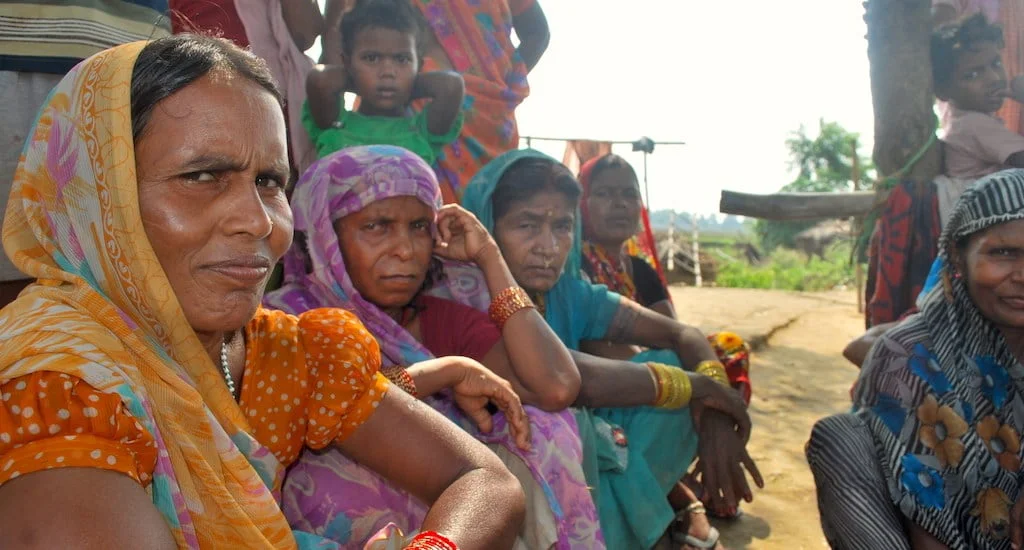Editor’s Note: This month, that is July 2020, FII’s #MoodOfTheMonth is Feminism And Body Image, where we invite various articles about the diverse range of experiences which we often confront, with respect to our bodies in private or public spaces, or both. If you’d like to share your article, email us at pragya@feminisminindia.com.
It is a commonly accepted notion, that those perceived as more “attractive” by authority figures such as work bosses, tend to benefit from this perception considerably. Looks have the tendency to leave a halo effect, thus leading to garnering of even more social capital than usual. Social media is filled with images of “perfection,” many-a-times found through using external tools. What is camouflaged, includes all visible variations from norms that feminism seeks to change. This pressure can be particularly felt by young women, the demographic which is also mostly seen in these problematic representations. One of the lesser desired features in social media close-ups, has become the easily-editable skin trauma or abrasions.

Most of us have experienced scars. I have a scar from a surgery, called within the medical circles as “zipper” affectionately. Whether it is through surgery, accident, acne, self-infliction, or infliction by another, these are changes in one’s body which are often tough to come to terms with. This gets exacerbated with the intensity, type, size, or visibility of the scars.
As one starts to heal physically and emotionally from the incident which leaves the scar, women in particular usually have another issue to deal with—that of confidence and identity.
A scar creates not just physical, but also emotional and psychological marks. Identity is called into question and individuals must integrate the scar with their sense of self in order to achieve continuity and psychological acceptance. Many women, with above average sense of confidence otherwise, may report shocking amounts of feelings of low self-worth. Even if they note it as a necessary part of their survival story, it still takes a lot to reconcile their sense of identity with this transformed physical self.
A scar creates not just physical, but also emotional and psychological marks. Identity is called into question and individuals must integrate the scar with their sense of self in order to achieve continuity and psychological acceptance. Many women, with above average sense of confidence otherwise, may report shocking amounts of feelings of low self-worth. Even if they note it as a necessary part of their survival story, it still takes a lot to reconcile their sense of identity with this transformed physical self.
These feelings and changes lead to more distress for women in our expectant society, because they are burdened with a lot more pressure to maintain unrealistic flawlessness for social standing of self, and somehow of all associations. It is also found through several publicly available studies that men are reported to be more attractive with certain scarring.
The skin is our largest sense-organ, and thus prone to experience afflictions. Theorists like Moss & Rosser describe the skin as a protective barrier separating self from the environment.
“A scar can be viewed as an intrusion—the barrier is no longer whole and one is left exposed.”
We base our self-identity upon social interactions and relationships. Body image, whereas, is one’s perception of one’s physical self. Being “different” can be intimidating and isolating. Oftentimes with physical “difference”, others focus on the difference instead of leading a normal conversation with attentive bodily cues like eye contact, which lead to high levels of self-consciousness triggered in the person.
Also read: Negative Body Imaging: How And Why To Disabuse It?
“Visible scars provide others a window into our lives, but what if we do not wish for others to peer through?”
Individuals with scars, experience intrusive questions, stares, social distancing, etc. This continuous hostile reaction or unwanted attention makes the person acutely aware of their difference. Initial meetings are awkward due to questions and recollections, making the search for deep connections more daunting. All this ends in difficulty initiating new relationships. The anticipation of rejection leads to forms of social disability, that can be characterised by coping strategies including avoidance of social interaction.
Views of personal relationships of family and other close social circles, can drastically affect an individual’s perception and emotions with respect to the scar, as well. Lack of sympathy may force them to minimise their feelings prematurely, whereas extreme concern can cause distress and feeling of shame or guilt. Something worth mentioning is the looking down upon women experience in large family structures, if they choose to bring attention to their health.
Views of personal relationships of family and other close social circles, can drastically affect an individual’s perception and emotions with respect to the scar, as well. Lack of sympathy may force them to minimise their feelings prematurely, whereas extreme concern can cause distress and feeling of shame or guilt. Something worth mentioning is the looking down upon women experience in large family structures, if they choose to bring attention to their health. It takes a lot of determination to push through all these scenarios, while simultaneously wishing that the next interaction doesn’t play the same way. Support of loved ones also plays a huge part in coping and well-being.

A strong determinant of the scar’s role, are also the narratives we build around it. Choosing the way to acceptance is a difficult decision, but an important one. As we grow, our bodies change in subtle ways. Conformity is desirable, but experiences are human. The pop Romance genre has given us at least one trope worth holding on to: love is a feeling which exists not because we are perfect, but one which is despite all flaws. We sometimes may take great pains to hide a scar, but beauty can be seen to often be lying in our distinctiveness in a permanently changing universe. Few would want their life story at that future point of looking-back, to be “I have been just the same since I was 20”.
Also read: It Is Absolutely Okay To Not Be Beautiful — Here Is…
It is said that we are not who we are because of the traumas, but from the work we put in in overcoming it. Figuring out how to tell the stories of those marks is what defines us as strong. All we need to do is just remember that healing takes time; and allow ourselves and our loved ones this sweet time.
References
Shefali Mehra is an undergraduate student in LSR, DU. She likes to explore the intersection of philosophy and ethics with other fields, such as mental health and technology governance. You can contact her on Instagram or LinkedIn.
Featured Image Source: Dribble




